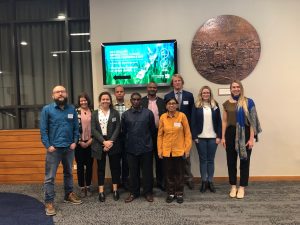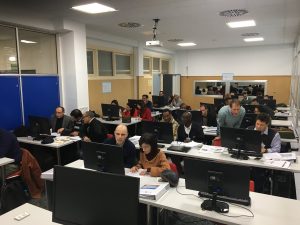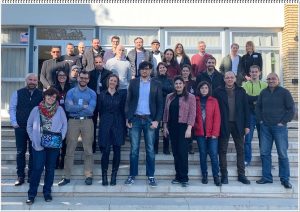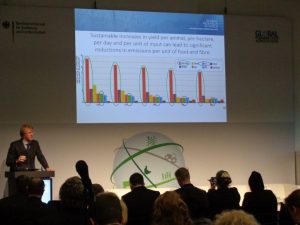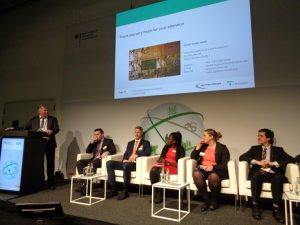Six greenhouse gas inventory specialists and researchers from developing countries visit New Zealand to learn about the compilation of the New Zealand national agricultural greenhouse gas inventory.
As part of its contribution to the Global Research Alliance on Agricultural Greenhouse Gases (GRA), New Zealand hosted six agricultural greenhouse gas inventory specialists, researchers, and government officials from Malawi, Uganda, Uruguay, Mexico, Colombia, and Indonesia from 8 to 12 April 2019.
During the training week, the group learnt about the New Zealand experience in developing the inventory methodology and prioritising research for inventory improvements, particularly for greenhouse gas emissions from livestock.
They attended the New Zealand Agricultural Climate Change Conference (NZACCC) in Palmerston North, hosted by the New Zealand Agricultural Greenhouse Gas Research Centre (NZAGRC). The conference was attended by more than 270 scientists, farmers, industry representatives, and policy makers coming together to discuss climate change mitigation and adaptation in the New Zealand context, and included 20 presentations from New Zealand-based experts in their fields, as well as panel discussions and questions from the floor. The conference also included a presentation by the GRA Special Representative, Hayden Montgomery, on ten years of international leadership through GRA research projects and collaboration.
Following the conference, the group participated in the 2019 Agriculture Greenhouse Gas Inventory Research Workshop, organised by the Ministry for Primary Industries. The workshop was attended by over 50 New Zealand scientists in addition to the international guests, with 13 countries represented in total. The workshop included updates on research projects relating to the New Zealand Agriculture Inventory, and four research priority discussion sessions on soil carbon, nitrous oxide emissions, methane and manure management emissions, and finally on data and modelling. The international guests presented their national perspectives on the strengths of their national inventories, as well as issues they are currently facing in improving their inventory methodologies.
Finally, the group met with officials from the New Zealand Ministry for the Environment, the New Zealand agency in charge of compiling the New Zealand inventory, and from the Ministry of Foreign Affairs and Trade. They learnt about New Zealand’s inventory arrangements and how statistics are collected for the agricultural inventory, and how they might tackle improvements in their inventories through drawing on experience from New Zealand’s senior agriculture inventory expert from the Ministry for Primary Industries.
The CIRCASA Project is hosting the webinar: “Strengthening the research community and structuring knowledge” on Friday 03 May, 2019.
In this webinar, the CIRCASA WP1 leader and colleagues will present the WP1 (Workpackage 1: Strengthening the research community and structuring knowledge) activities, first results of the researcher’s survey, as well as current cartography of the scientific network working on the field of soil organic carbon sequestration in agriculture.
Programme: 1 hour
Intro: WP1 overviews and activities: Pete Smith
Researchers survey results: Andy Bray
The Research Network: Jan Verhagen
Speakers:
Pete Smith – WP1 leader, Professor of soils and Global Change at the Institute of Biological Sciences at the University of Aberdeen, Scotland, UK.
Andy Bray – Research fellow, specialising in biogeochemistry and environmental mineralogy at the School of Earth and Environment, University of Leeds, UK.
Jan Verhagen – Senior scientist, specialising in agricultural systems, carbon cycle, and climate adaptation at the Wageningen Plant Research, Netherlands.
The Integrative Research Group (IRG) of the Global Research Alliance on Agricultural Greenhouse Gases (GRA) is hosting its first webinar meeting: “IRG linkages with the 4p1000 initiative and the CIRCASA project”.
This webinar is part of a series of webinars which aim to inform the GRA community and others about the IRG activities contributing to the GRA goals. For this first time, the presenters will mainly talk about other projects and initiatives’ structure and how they interact with and complement the IRG activities. They will present “The Coordination of International Research Cooperation on Soil CArbon Sequestration in Agriculture” (CIRCASA) and the “4per1000: Soils for food security and Climate” initiative.
Programme: 1 hour
Presentation of the IRG network and activities: Pamela Joosse
Presentation and structure of CIRCASA Project: Jean-François Soussana
Presentation and structure of the 4p1000 Initiative: Paul Luu
Discussion: Link between initiatives and possible interactions
Speakers:
Pamela Joosse – IRG co-chair, Senior Soil and Nutrient Management Specialist
Jean-François Soussana – IRG co-chair and CIRCASA project coordinator, Vice President in charge of International Policy of INRA
Paul Luu – Executive Secretary of the 4p1000 initiative, Agronomist specialized in tropical agronomy and agroforestry
The first issue of the Croplands Research Group (CRG) newsletter is now available!
In this edition you can read about:
- The “4 per 1000” initiative: soils for food security and climate.
- Brazil agenda on sustainable intensification.
- Silvopastoral systems as climate smart agricultural practice in Argentina
- Climate change projects: AFINET project and the SheepToShip LIFE project.
- Interesting events, including upcoming conferences, workshops, and much more.
Aarhus University is hosting the Conference Circular Bioeconomy Days 2019 from 25 June to 27 June.
The transition to circular bioeconomy has enormous industrial potential and significant benefits for the environment, climate and a sustainable society.
How can companies and agriculture enter into a circular bioeconomy, and how do we ensure that its further development will be of value to industry and society? These questions are the focal points of the conference Circular Bioeconomy Days 2019, to be held from 25 to 27 June 2019 at Aarhus University in Foulum.
The conference organisers are Aarhus University’s Centre for Circular Bioeconomy (CBIO), SEGES, Agro Business Park, Central Denmark Region, Viborg Municipality, INBIOM and the EU project Green VALLeys.
The event will gather the most important Danish and international actors, who will discuss circular bioeconomy as a tool to implement the UN Sustainability Development Goals, and, more precisely, to develop the sustainable protein of the future.
To read more about the conference, including how to register, please click her .
To view the conference programme, please click here.
Applications are invited for a PhD fellowship the Graduate School of Science and Technology, Aarhus University, Denmark, within the Animal Science programme. The position is available from 1 August 2019 or later.
Title:
Feeding Strategies to Reducing Enteric Methane from Dairy Cows
Research area and project description:
Enteric fermentation in ruminants results in a significant production of methane which not only constitutes a significant part of the carbon footprint of dairy and beef production, but also represents a significant loss of energy. The ruminant sector thereby contributes substantially to the total agricultural greenhouse gas emission in Denmark. This calls for not only the development of mitigation strategies to reduce enteric methane, but also a deeper understanding of the fundamental mechanisms in the rumen related to methane production. This project will focus on quantifying enteric methane using respiration chambers, identifying mitigation strategies primarily related to feeding, and quantifying animal variation in response to a given feeding strategy aiming at reducing enteric methane. The project will include digestibility trails using rumen and intestinally cannulated dairy cows and statistical analysis of data from different types of experiments.
This project will have an important impact not only in the scientific community but also among farmers and consumers, as reducing the carbon footprint of dairy production is essential for numerous private and public stakeholders.
Qualifications and specific competences:
Required:
- Relevant Master’s degree
- Excellent verbal and writing skills in English with very good communication skills
- Experience in dairy cow nutrition and physiology
Preferred:
- Experience with some of the following techniques: measuring enteric methane emission from ruminants, quantification of digestion of nutrients using marker techniques, feed evaluation, digestibility and balance trials
- Experience in statistical analysis of animal experiments
- Hands-on ruminant feeding trials
- Demonstration of research activities (conference or journal papers)
Place of employment and place of work:
The place of employment is Aarhus University, and the place of work is at the Department of Animal Science, Aarhus University-Foulum, Blichers Alle 20 , DK-8830 Tjele, Denmark.
Please note all applications must be received no later than 1 May 2019 (Danish time).
Applying: to read more about the fellowship and to apply please click here to visit the website of Aarhus University .
The International Livestock Research Institute (ILRI) seeks to recruit a PhD Graduate Fellow to investigate GHG emissions from rangelands by focusing on enteric methane emissions of rangeland-based beef production systems in Kenya.
Responsibilities of the fellow
- To study enteric methane emissions from beef cattle kept on different rangelands in Kenya;
- To test and compare different methodologies for measuring and/or calculating enteric methane emissions (e.g., respiration chamber, SF6 tracer technique, IPCC’s Tier 2 approach for calculating emission factors);
- To collect data on animal performance, activity, intake, diet composition, rangeland species composition and basal cover etc.;
- To test possible interventions and their effects on methane emissions and animal performance;
- To upscale the results on a regional basis for different rangeland systems using a partial life-cycle assessment (LCA) approach;
- To closely work together, cooperate and participate in supervision of MSc students and field research staff;
- To statistically analyze the data, write scientific papers and prepare conference/workshop presentations;
- To cooperate and share results with an interdisciplinary team of researchers with different backgrounds (animal nutrition, biogeochemistry, social sciences, gender studies, rangeland ecology etc.)
Requirements for the ideal candidate
- MSc in Agricultural Sciences (preferably Animal Nutrition with a focus on ruminants), Environmental Sciences, Rangeland Ecology, or another relevant discipline;
- Experience in greenhouse gas measurements at different scales, i.e. respiration chambers or SF6 tracer technique would be an advantage;
- Experience in upscaling field data by modelling or LCA approaches would be an additional asset;
- Knowledge of grassland/rangeland-based production systems in developing and/or developed countries are an advantage;
- Experience in handling of diverse datasets, data processing and statistical software such as R, SPSS, Matlab or python;
- Careful and correct mode of work, especially about field data collection and data analysis, demonstrated skills in writing scientific papers;
- Experience of living or working in the context of developing countries, especially East Africa, would be beneficial;
- Willingness to perform field work in rural conditions and ability to work independently and solution-oriented;
- Ability to cooperate with students and field assistants, farmers and other stakeholder groups, and partly supervise MSc students;
- Ability to jointly work in a multinational team of scientists, technicians and students from other disciplines (biogeochemistry, agricultural sciences, environmental sciences, ecology, social sciences etc.);
Location: ILRI, Kenya, Mazingira Centre
Duration: 3 years
Closing Date: 30 April 2019
Apply: to read more about the fellowship and to apply, please click here to access the ILRI webesite.
Four of last year’s CLIFF-GRADS recipients from Argentina have chosen to share their research stories with the Global Research Alliance on Agricultural Greenhouse Gases.
María De Bernardi, from the National University of the Centre of the Province of Buenos Aires, completed a six-month research stay at the Instituto de Investigaciones Agropecuarias, INIA Remehue, Osorno, Chile, where she collaborated on the project “Nitrous oxide emissions from pastures using novel fertilizer formulation.” Florencia Garcia, from the National University of Córdoba, also completed her research stay at INIA Remehue, where she was selected for the project: “Effects of inhibiting rumen methanogenesis on microbial biomass production and composition.”
Banira Lombardi, from the National University of the Centre of the Province of Buenos Aires, studied for four months at the International Center for Tropical Agriculture (CIAT) in Cali, Colombia, working for the project “Pasture type influence on soil N2O emission from cattle excreta.” Sebastián Vangeli, from the National Institute of Agricultural Technology, was hosted by Rothamsted Research and Bangor University, UK, for the project “Structures and date requirements to develop a higher tier agricultural GHG inventory.”
All four CLIFF-GRADS awardees have emphasised the importance of becoming familiar with new research techniques and the promotion of international bonds as highlights of their time abroad. To read more about the CLIFF-GRADS experiences of the Argentinian awardees, please click here for photos and summaries penned by the students themselves.
CLIFF-GRADS is a joint initiative of the CGIAR Research Program on Climate Change (CCAFS) low emissions development flagship and the Global Research Alliance on Agricultural Greenhouse Gases (GRA). CLIFF-GRADS aims to build the capability of early career agricultural students in developing countries to conduct applied research on climate change mitigation in agriculture. CLIFF-GRADS integrates the GRA’s Development Scholarship and the CCAFS Climate Food and Farming Research Network with the common goal of providing grants to graduate students to expand their knowledge and experience in quantification of agricultural greenhouse gases. Research projects are hosted by CCAFS and GRA members and partners. Funding for CLIFF-GRADS is provided by the Government of New Zealand and by the CGIAR Trust Fund and bilateral agreements in support of CCAFS.
To read more about the CLIFF-GRADS initiative, please click here.
The VII Remedia Workshop “Agroforestry Systems as a Solution to Climate Change” will take place in Lugo, Spain, Europe, during 27th – 28th March 2019. The workshop will include sessions about mitigation of GHG in livestock, agricultural and forest systems within the framework of the agroforestry systems and will start with a keynote from the CRG GRA chair Proff. Ladilau Martin and also with presentations of relevant GRA activities such as those conducted by GRA members related to the CIRCASA and AFINET projects. There will also be a workshop linked to the Spanish Red NUEVA to show stakeholders how to measure greenhouse gas emissions. For more information about the workshop click here.
The Order of Engineers of Tunisia is organising, with the collaboration of the World Federation of Engineering Organizations, an international conference on sustainable food systems and food security: “Engineering and Food Security in Africa” (EFS Africa 2019) on June 24th and 25th. The conference will bring together more than 250 engineers, climate change experts, and policy makers from various African countries to establish an operational action plan aimed at improving food security in Africa. The action plan will be announced in the Tunis Declaration, which will be sent to the UN General Secretary and African heads of state.
To read more about the conference, including how to apply, please see the documents in the links below and click here to visit the EFS Africa website. The deadline for the submission of abstracts is March 15, 2019, so if you are interested in attending be sure to apply soon.
PDF: International Conference Engineering and Food Security in Africa
The Global Research Alliance on Agricultural Greenhouse Gases together with the International Center for Advanced Mediterranean Agronomic Studies (CIHEAM), the Food and Agriculture Organization of the United Nations (FAO), the International Center for Agricultural Research in Dry Areas (ICARDA), the Red Remedia, and the 4 per 1000 Initiative organised an advanced course for professionals on livestock and climate change: “Livestock and climate change: Assessment of emissions, mitigation options and adaptation strategies.”
The course took place from 11 to 15 February 2019 in Zaragoza, Spain, and was hosted by CIHEAM Zaragoza. It provided participants with over 20 hours of in-class training and 14 hours of practical work and debate supplemented by real-life case studies in the context of Mediterranean agriculture and climate change conditions. Participants were given the opportunity to engage in practical exercises on greenhouse gas national inventories calculations while learning more about adaptation and mitigation strategies, measuring methodologies and modelling tools in livestock systems. They also networked with experts and professionals from other countries interested in livestock farming and the mitigation of the effects on the climate and the environment.
For more information about the CIHEAM Zaragoza institute click here to visit their website and here for their twitter.
The 11th Global Forum on Food and Agriculture (GFFA) “Agriculture Goes Digital – Smart Solutions for Future Farming” was held in Berlin, Germany from 17th to 19th January.
The GRA organised an expert panel “Blue skies for green farms: a 21st century research agenda,” which was chaired by the GRA Council Chair, Dr. Wolfgang Zornbach, Federal Ministry of Food and Agriculture, Germany. Participating in the panel were the GRA Special Representative, Hayden Montgomery, Daniel Tudela Staub, Thünen Institute of Farm Economics, and a panel of young farmers from the World Farmers Organisation, including Tero Sarkala, Finland; Martha Agyemang, Ghana; Brian Rushe, Ireland; Sarah Crofoot, New Zealand. The panel discussion addressed plausible agricultural development pathways to reduce agricultural greenhouse gas emissions and included a presentation of global mitigation research being conducted through the Global Research Alliance by its members and partners across livestock, crops and rice production systems as well as a deep-dive into soil research and farm economics being conducted by Germany and collaborators in the Agri-Benchmark initiative.
The GRA Special Representative also participated in an event organised by the World Farmers Organisation (WFO), which explored the opportunities and challenges of digitalisation for young farmers as well as the ways in which businesses and industry can help farmers achieve sustainable food security.
The GFFA is an annual international conference, organised by the German Federal Ministry of Food, Agriculture and Consumer Protection. The aim of the conference is to address key questions regarding the future of the global agri-food industry. The conference provides representatives from the worlds of politics, business, science and civil society with the opportunity to share ideas and enhance their understanding on a selected topic of current agricultural policy, and is the world’s largest conference of agriculture ministers. To read more about the GFFA click here.

